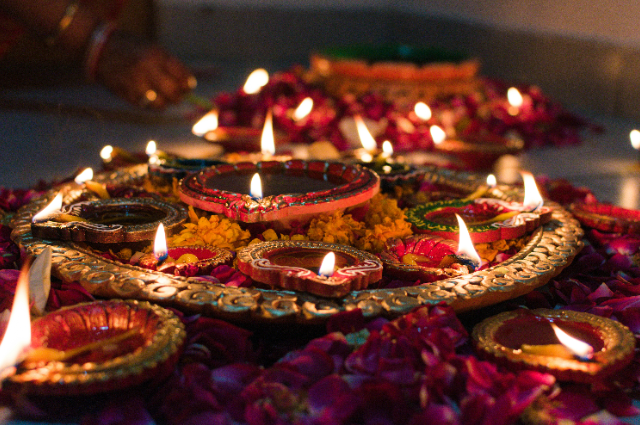
Photo by Udayaditya Barua on Unsplash
Introduction
Diwali, the Festival of Lights, is one of the most celebrated festivals in India and across the world. Its appeal goes beyond regional, cultural, and religious boundaries, with its themes of light triumphing over darkness and good overcoming evil. This article explores the different facets of Diwali, from its historical significance to its modern-day interpretations, focusing on how it unites people through a shared sense of joy, gratitude, and hope.
1. Origins of Diwali: A Celebration Rooted in Mythology and History
Diwali’s roots can be traced to several ancient myths and legends, each depicting various interpretations of victory and justice. The most popular legend is the return of Lord Rama to Ayodhya after his 14-year exile, which was celebrated by illuminating the city with oil lamps. Similarly, in other parts of India, Diwali honours the goddess Lakshmi, who symbolises prosperity and wealth. These stories have embedded Diwali into the collective memory of Indian culture, symbolising the importance of honour, resilience, and hope.
2. The Five Days of Diwali: Rituals and Their Meanings
Diwali is celebrated over five days, each with its own distinct meaning and customs. The first day, Dhanteras, is dedicated to wealth and prosperity. On the second day, Naraka Chaturdashi, the focus shifts to cleansing and purification. The third day, Diwali itself, is when homes and temples are illuminated with lamps. The fourth day, Govardhan Puja, involves thanksgiving, and the fifth day, Bhai Dooj, celebrates sibling bonds. These days collectively underscore values such as gratitude, family, and the renewal of relationships.
3. The Significance of Light in Diwali Celebrations
Light plays a central role in Diwali, representing enlightenment, knowledge, and goodness. The lighting of diyas (oil lamps) is a symbolic gesture to dispel darkness, both physically and metaphorically. In Hindu philosophy, light represents the removal of ignorance and the pursuit of truth. This concept is reflected in the belief that by lighting lamps, individuals invite positive energy and illuminate the path toward self-awareness and understanding.
4. The Social Aspect: Diwali as a Festival of Community and Unity
Beyond individual households, Diwali fosters a sense of community. People come together, share sweets, and partake in rituals, bridging differences in beliefs and backgrounds. In cities and villages alike, people gather to exchange gifts and share meals, creating a space where communal ties are strengthened. In this way, Diwali serves as an annual reminder of the importance of social bonds and the joy that comes from togetherness.
5. Diwali and Economic Impact: A Boost to Markets and Small Businesses
Diwali is not only a cultural festival but also an economic event with significant impact. Markets across India witness a surge in sales, from sweets and decorations to new clothes and household items. Many businesses, particularly small and family-owned shops, depend on Diwali sales to sustain themselves. The festival stimulates the economy, encouraging people to buy and sell goods, thereby contributing to the livelihoods of countless families.
6. Environmental Concerns: The Challenge of Sustainable Celebrations
While Diwali’s traditional rituals are celebrated with reverence, modern practices often involve environmental challenges. The use of fireworks contributes to air pollution, while mass production of synthetic decorations generates plastic waste. Efforts to promote eco-friendly celebrations, such as using biodegradable materials and reducing fireworks, are growing. This shift reflects a collective responsibility to preserve the environment while honouring traditional practices.
7. Diwali in the Global Context: A Festival Embraced Worldwide
Diwali is celebrated in countries around the world, from Nepal and Sri Lanka to the UK, the US, and beyond. In multicultural cities, public celebrations of Diwali bring together people from various ethnicities, showcasing Indian culture. Events held in places like London’s Trafalgar Square or New York’s Times Square reflect the festival’s global reach and its role in promoting intercultural understanding. These international celebrations highlight how Diwali has become a symbol of shared human values.
8. Diwali’s Influence on Art, Literature, and Media
Diwali has also inspired various forms of art, from paintings to films and literature. The festival’s themes of light, victory, and renewal have been captured in numerous works, reflecting its timeless appeal. In Indian cinema, Diwali scenes often evoke emotional connections with family and heritage. Similarly, contemporary literature frequently explores Diwali’s cultural significance, illustrating its relevance across generations and artistic mediums.
9. The Symbolism of Lakshmi Puja: Wealth and Prosperity Beyond Material Gains
Lakshmi Puja, conducted on Diwali’s main day, is not only about material wealth but also symbolic of inner abundance. By worshipping Lakshmi, people acknowledge the value of both financial stability and emotional fulfilment. This ritual emphasises that wealth is holistic, encompassing well-being, happiness, and contentment. Thus, Diwali’s message extends beyond materialism, promoting a balanced approach to wealth.
10. Diwali and Contemporary Challenges: Preserving Tradition in a Changing World
As the world modernises, traditional practices of Diwali face both opportunities and challenges. Digital innovations allow for virtual celebrations, while urbanisation alters the ways people observe the festival. Despite these changes, Diwali continues to hold its place as a cultural cornerstone. The challenge lies in adapting practices to modern contexts while preserving the essence of the festival. Embracing these shifts, Diwali remains a resilient symbol of continuity and heritage.
Conclusion
Diwali, in its essence, is a celebration of light, unity, and renewal that transcends cultural and temporal boundaries. Through its rich tapestry of myths, rituals, and symbols, the festival reinforces timeless values that resonate with people worldwide. As society evolves, Diwali serves as a reminder of humanity’s shared aspirations for peace, prosperity, and harmony, bridging past traditions with present and future generations.
